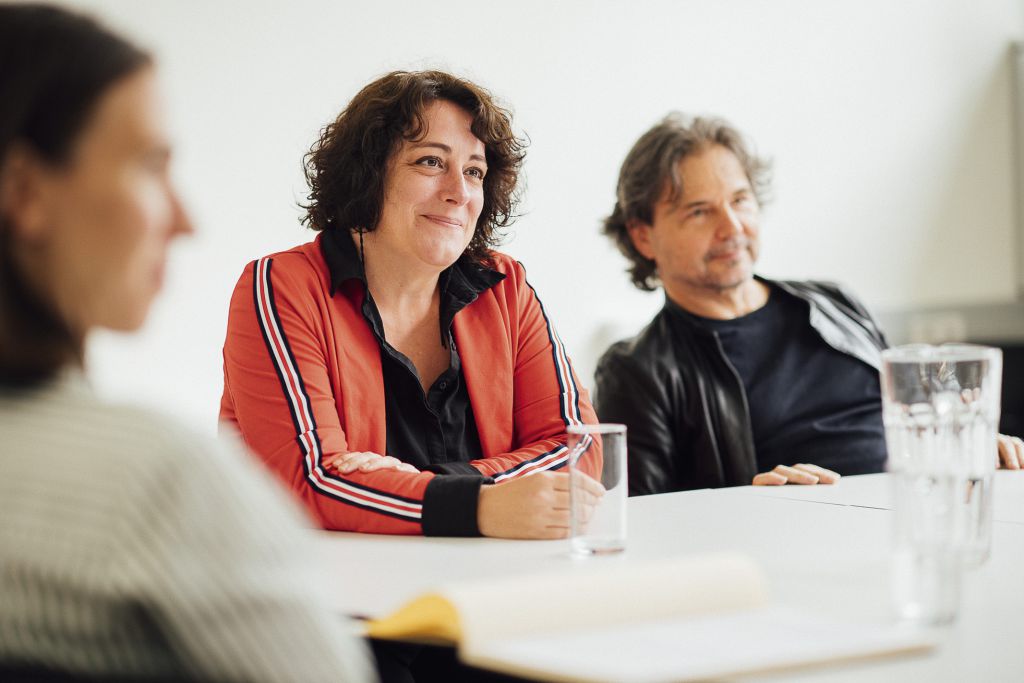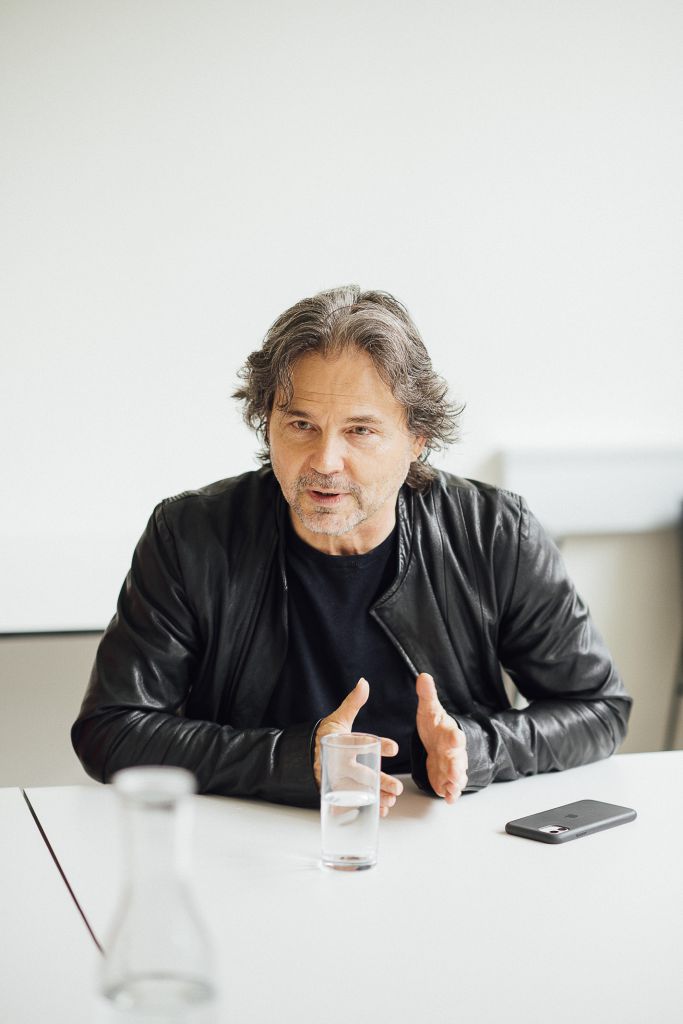Eine Gesprächsrunde über die Musik im Film, über Kommunikation und Tantiemen in Thunfisch mit dem neuen Professor für Filmmusik Walter Werzowa, der Professorin für Medienkomposition und Angewandte Musik Judit Varga, dem Regie-Studenten Wolf-Maximilian Liebich sowie der Schnitt-Absolventin Barbara Seidler.
Erstmals gibt es aan der mdw eine Professur für Medienkomposition mit Schwerpunkt Filmmusik – Walter Werzowa trat diese mit 1. Oktober an. Welche Überlegungen haben zu dieser Professur geführt?
Judit Varga (JV): Ja, das ist etwas Neues, und ich bin davon überzeugt, dass es der richtige Weg ist. Wir haben auch bisher Filmmusik unterrichtet, aber nur etwa ein Sechstel unseres Portfolios ist Filmmusik – jetzt ist es das erste Mal, dass wir mit einer Spezialisierung starten. Die Nachfrage dazu ist unter den Studierenden groß. Nicht zuletzt sind wir hier im Future Art Lab in unmittelbarer Nachbarschaft der Filmakademie – es liegt auf der Hand, dass wir diese Verbindung ausbauen. Dass wir unsere Beziehung stärken und möglicherweise neue Studienpläne entwerfen – den Studienzweig Filmmusik haben wir immer noch nicht. Da liegt allerdings auch noch ein weiter Weg vor uns.

Herr Werzowa, Sie kommen aus einem vielseitigen musikalischen Tätigkeitsfeld, haben Scores für Hollywoodfilme geschrieben, ikonische Jingles für Unternehmen komponiert, machen Sounddesign, kreieren akustische Brandings und vieles mehr. Was nehmen Sie von all diesen Erfahrungen für Ihre neue Aufgabe an die mdw mit?
Walter Werzowa (WW): Bei mir geht es um Praxis und Teamarbeit. Ich möchte mit meinen Studierenden die Diplomarbeiten der Filmakademie als Filmkomponist_innen begleiten – so, dass sie mit den Regisseur_innen, den Autor_innen reden können und zusammen wachsen. Im Vordergrund steht für mich nach 30 Jahren in Amerika die Zusammenarbeit. Mein Traum ist, dass sich die Komponist_innen und Orchestermusiker_innen hier an der mdw mit den Filmstudierenden anfreunden, zusammenarbeiten und dabei die Branche kennenlernen. Musik ist etwas sehr Subjektives, es kann sein, dass ein Komponist etwas Großartiges schreibt und der Regisseur findet es furchtbar. Wie gehe ich damit um? Wie kann ich das Projekt retten? Wie kann ich dem Regisseur das Vertrauen geben, dass ich trotzdem ein guter Komponist für ihn bin?
JV: Das sind wichtige Fragen! Das Umgehen mit der Frustration muss man lernen. Aber auch die Kommunikation – es ist schon für uns Musiker_innen untereinander so schwierig, über Musik zu sprechen, viel mehr noch für Produzent_innen und Regisseur_innen, die sich nicht so gut in der Musik auskennen. Das ist oft eine Hemmschwelle in der Zusammenarbeit, es ist wichtig, dass man diese abbaut.
Herr Liebich, Sie vereinen beide Seiten: Sie studieren Regie an der Filmakademie, haben etliche Filme gedreht und machen Musik sowohl in diversen Band-Projekten als auch für Ihre eigenen Filme. Von welcher Richtung gehen Sie an ein Projekt heran?
Wolf-Maximilian Liebich (WML): Ich habe eine starke Affinität zu Sounddesign und Tönen. Für mich war es immer schon seltsam, dass die Tonebene im Film so stiefmütterlich behandelt wird. Das fängt an mit dem Setton – der Ton muss immer dafür kämpfen, dass er gute Aufnahmen bekommt. Manche Regiseur_innen übernehmen gerne die Kamera, ich übernehme eben gerne die Tonebene. Ich mache sehr persönliche Filme, und mir ist es wichtig, dass ich aus dem persönlichen Erfahrungsschatz, aus der Idee, die einem Film zugrunde liegt, auch auf der Tonebene schöpfen kann. Für mich ist der Ton, die Musik eine Stärke, die im Film unterschätzt wird.

Frau Seidler, Sie haben im Sommersemester Ihr Schnitt-Studium an der Filmakademie abgeschlossen. Wann kommt bei Ihrer Arbeit an einem Film die Musik ins Spiel? Und wie sieht dann die Beschäftigung damit aus?
Barbara Seidler (BS): Das ist sehr unterschiedlich – die Musikvorstellung, was es und ob überhaupt sein soll, kommt meist von der Regie. Wenn die Regie keine genaue Vorstellung hat, versuchen wir, zusammen etwas zu finden. Den Rohschnitt mache ich ohne Layout-Musik. Das ist Geschmackssache. Andere Editor_innen schneiden gerne mit Musik und geben sie dann wieder weg. Das Problem mit Layout-Musik ist, dass man sich zu sehr daran gewöhnt.
Wie betrachten Sie die Entwicklung der Filmmusik von den großen Melodien, mit denen Ennio Morricone samt Orchester in Stadien das Publikum begeistern konnte, von Soundtracks, die unabhängig von den Filmen auf CD gekauft wurden, bis hin zu aktuellen Netflix-Serien, die Kate Bush mit einem 35 Jahre alten Song auf Platz eins der Charts bringen? Wie hat sich die Bedeutung der Filmmusik verändert, und was bedeutet das für Komponist_innen?
JV: Auch heute gibt es noch Veröffentlichungen von Soundtracks – vielleicht nicht mehr auf CD, aber auf Streaming-Plattformen. Europäische Filmmusik ist heute ganz anders als amerikanische, auch genreabhängig. In den letzten Jahren habe ich bei uns festgestellt, dass die schönen, guten Melodien verschwunden sind – das ist etwas, was das Publikum merken könnte. Oft wird einfach ein Skelett an Musik verlangt und verwendet, das schöne Klangfarben beinhaltet und Akkorde, aber etwas zum Mitsingen gibt es selten.
WW: Die Musik ändert sich zum Glück laufend, und sie ändert sich immer schneller. Auch Konzerte werden noch gemacht, Hans Zimmer hat großen Erfolg mit seinen Touren, auch in Wien. Ich glaube aber, dass mehr und mehr der Filmkomponist sein Bild verliert. Viele Filme sind bunter. In den 1980er, 1990er Jahren wurde ein Filmkomponist ausgewählt, der hat alles gemacht, sogar die Source-Musik und vielleicht auch Lieder. Das passiert jetzt auch noch, aber oft werden mehr Leute einbezogen. Morricone hat Glück gehabt – er hat seine Musik immer schon vor dem Filmdreh geschrieben. Seine genialen Melodien wollte kein Editor zerschneiden. Die jetzige Musik ist ein bisschen amorpher, flexibler, lässt sich leichter zerschneiden.
WML: Ich habe den Eindruck, dass die elektronische Musik und die technischen Möglichkeiten starken Einfluss auf die Filmmusik haben. Man braucht nicht gleich ein ganzes Orchester, man kann sehr gut auch mit Sample-Aufnahmen arbeiten. Abgesehen von komponierter Musik wird im Film mit Tönen und Sound gearbeitet, mit Stimmen, mit Geräuschen. Ich finde, dass die Welt schon für sich ganz toll klingt. Wenn ich für einen Film Musik machen soll, dann will ich auch nichts zerstören, manchmal möchte ich dem gar keine zusätzliche Ebene hinzufügen. Das ist für mich der Idealfall, dass der Film selbst schon so schön und lyrisch klingt, dass es die Ebene der Filmmusik gar nicht mehr braucht.
Was sind die Fähigkeiten, die Studierende für Filmkomposition brauchen? Das musikalische Können, technische Fähigkeiten, aber auch ein genaues Verständnis davon, wie die Arbeit am Film funktioniert?
JV: Komponist_innen, die Filmmusik schreiben, müssen in ihrem Beruf schon sehr sattelfest sein. Sie müssen jede Aufgabe von Regie oder Schnitt lösen können. Egal welcher Stil, welches Genre, welche Dramaturgie, welche Länge. Da brauche ich sehr gutes, breites Handwerk. Dann muss man sehr fit sein in Studiotechnik, Programmieren, Produzieren. Die dritte Säule ist Dramaturgie; zu lernen, wie man einen Film sieht. Nicht als Publikum, sondern zu verstehen, wie eine Szene aufgebaut ist, was die Regie ausdrücken möchte. Die vierte Säule wurde schon angesprochen: Kommunikation – bis hin zur Psychotherapie mit den Filmkolleg_innen.

WW: Die Studierenden sind schon sehr sattelfest im Komponieren – mehr als das. Ich möchte, dass sie Freude bei der Arbeit haben und die Angst davor verlieren, Fehler zu machen. Ich wurde vor Jahren von einem Designer, der am Filmtitel von Eraser gearbeitet hat, kontaktiert, der mir sagte, der Regisseur sei mit dem Score von Alan Silvestri für den Main Title nicht zufrieden – ob ich einen Einfall hätte. Ich habe mich sofort hingesetzt und etwas geschrieben. Um vier Uhr morgens, beim Einspielen, habe ich mich vor Müdigkeit komplett vergriffen. Beim Anhören fand ich das Ergebnis dann sehr originell, habe es gelassen und mein Titel ist genommen worden. Das war mein erster großer Erfolg in Amerika, daraus hat sich für mich sehr viel ergeben. Keine Angst vor Fehlern zu haben, ist enorm wichtig. Als ich studiert habe, hat man uns immer gesagt, was du machst, ist furchtbar, Schubert war viel besser! Das war furchtbar frustrierend. In meine Lehre möchte ich hineinbringen, dass da Spaß dabei ist.
JV: Spaß ist ja kein Gegensatz zu Qualität. Ich bin besessen von Qualität. Man muss nicht leiden, um etwas Gutes zu produzieren, das geht mit Spaß Hand in Hand. Auch wie schnell oder wie langsam man komponiert sagt nichts über die Qualität aus. Es muss gut klingen, es muss nicht nach Schweiß riechen. Was du über die vergriffene Aufnahme sagst – meine Katze hat auch schon Passagen aus meiner Oper komponiert, weil sie über das Keyboard gelaufen ist, und ich habe es gelassen.
WW: Kannst du mir die Katze borgen?
JV: Ja, aber das kostet, sie ist sehr gut! Und die Tantiemen lässt sie sich in Thunfisch ausbezahlen (lacht). In der Filmmusik ist es sehr wichtig, authentisch zu sein – die Versuchung ist groß, dass man Sachen kopieren möchte oder sogar muss. Ich bekomme ein Layout, die Regie ist verliebt in den Hans-Zimmer-Soundtrack und ich soll dem so nahe wie möglich kommen, ohne dass man mir viel zahlen muss. Es gibt solche Aufträge. Zum Lernen ist das gut, aber später nicht mehr. Egal wie ich das probiere, ich bin immer der schlechtere Hans Zimmer als Hans Zimmer selbst. Aber die gute Nachricht ist, ich bin die beste Judit Varga der Welt! Wenn man zu sich findet, ist man auf einem guten Weg.
WW: Selbst Hans Zimmer will nicht Hans Zimmer kopieren. So jemand findet es furchtbar, wenn er ständig mit seiner eigenen Hitparade konfrontiert ist und immer wieder das Gleiche machen soll.

BS: Das betrifft wirklich jede Kunstrichtung. Auch als Filmemacher_in will man ja nicht seine Lieblingsregisseure kopieren, sondern eine eigene Sprache finden.
An der Filmakademie haben Sie bereits für Ihre Regieübungen mit Kompositionsstudierenden zusammengearbeitet – welche Erfahrung haben Sie daraus gewonnen?
BS: Musik ist ja kein Hauptfach an der Filmakademie – manche Studierende befassen sich von sich aus mit Scores und Sounddesign, für andere steht das weniger im Fokus. Für mich war die Zusammenarbeit mit den Komponist_innen eine positive Erfahrung.
WML: Ich freue mich eigentlich immer darauf, die Musik für meine Filme zu komponieren, aber wenn ich den Film sehe, kann ich keine Musik mehr dazu machen, weil ich immer das Gefühl habe, dass es zu viel ist.
JV: Ein guter Filmemacher schafft Platz für Musik in seinen Filmen – wenn er sie möchte. Die Tonebene muss ausgedünnt sein, die Bildebene funktioniert anders, Schnitt ist ganz wichtig.
BS: Das stimmt – für mich ist es entsetzlich, wenn nach dem Schnitt noch die Filmmusik ausgetauscht wird. Ein Problem per se beim Film ist, dass man oft viel zu spät im Entstehungsprozess zum Sounddesign kommt – oft erst, wenn der Film schon abgedreht ist. Dabei wäre es viel besser, Komponist_innen schon in der Drehbuchphase einzubinden.
Wie geht es mit den beiden Instituten und ihren Kooperationen weiter, jetzt, wo Filmakademie und Komposition im FAL in nächster Nachbarschaft wirken?
BS: Der Lehrgang für Elektroakustische und Experimentelle Musik (ELAK) und die Filmakademie haben ja schon länger eine Kooperation, wir Studierenden lernen uns kennen, das hat sich gut eingespielt. Mit den Komponist_innen muss das noch kommen, da gibt es bislang keine Plattform. ELAK-Studierende, die mal bei einem Dreh dabei waren, werden weiterempfohlen und man knüpft Netzwerke, aber dass man Kompositionsstudierende der mdw für die Filmmusik anfragt, ist noch nicht üblich.
JV: Das ist uns bewusst – wir haben einen Composer-Filmemacher-Stammtisch geplant. Aber seit wir im Future Art Lab eingezogen sind, hat die Pandemie alle Treffen verhindert. Es gibt noch Startschwierigkeiten, aber ich glaube, beide Seite wollen mehr Austausch, und das werden wir jetzt angehen.
WW: Das muss doch möglich sein. Ich glaube, jeder Regiestudierende hätte bei uns zehn Filmkomponist_innen zur Auswahl!

